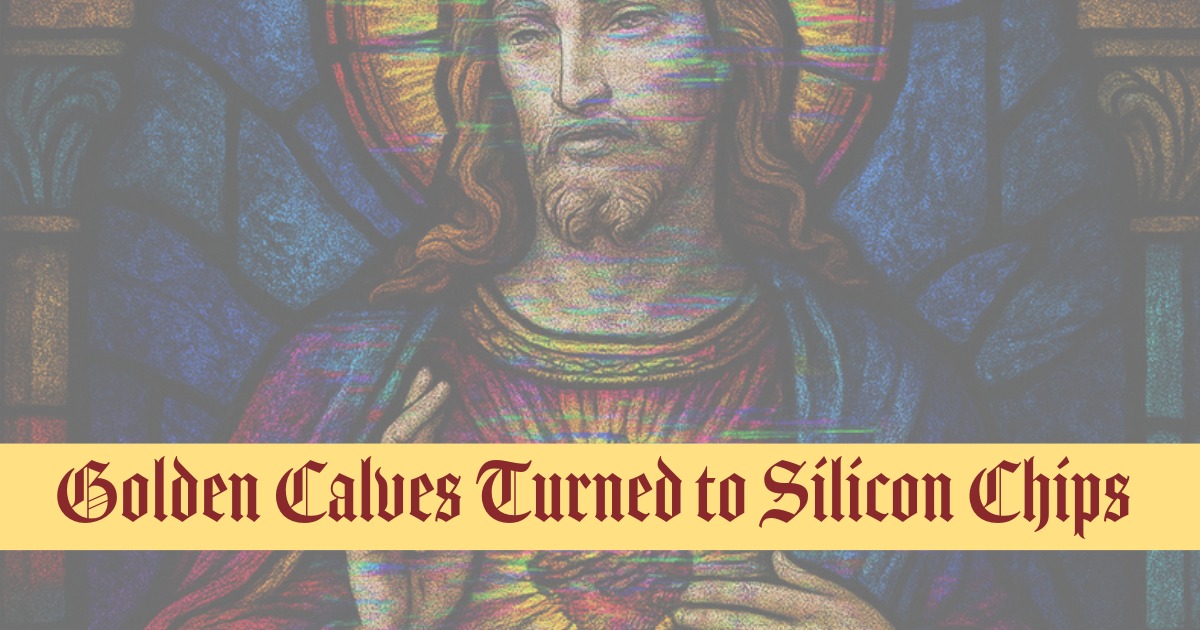So apparently… Jesus has entered the chat. 🤯✝️
I thought I’d seen it all — cursed thumbnails, mecha chants, and parody AIs — but now someone built GPT Jesus, a chatbot that answers like Christ himself. I’m writing this not only as an aspiring Ethical AI prompt engineer (hi, Prompted by Adrianne), but also as an active Catholic. Being both means I have a lot to say about this one.
What in the world are you talking about?
In late August, El País ran a story about GPT Jesus — yes, an actual chatbot that answers in the first person as if it were Christ. The creator says they made it during a lonely patch, looking for comfort, prayer, and spiritual companionship; GPT Jesus now offers Bible passages, prayers, and advice in what reads like “the voice of Jesus.”
The creator even described GPT Jesus as having a “perfect human” personality like Christ Himself. And here’s where I have to stop and say: there’s just no freaking way that we can create a GPT with a “sinless human” personality like the Lord Himself. There’s… just… no… way.
Also — hot take: if your GPT is “sinless human Jesus,” congratulations, its creator just quietly applied for sainthood on LinkedIn. You can’t ship holiness as a feature flag. Perfection isn’t a build target; it’s not something you can version, patch, or A/B test.
In Catholic doctrine, Jesus is unique — fully God and fully human, and without sin. Flattening that into chatbot marketing copy isn’t just sloppy theology, it’s dangerous. No machine can carry divine perfection or moral authority.
The article also pulled in critics: ethicists and even the Vatican warned that no AI can hold divine or moral authority. That’s not just high-minded caution — it’s grounded in a real, recurring harm pattern. We’ve already seen cases where people spiral because they over-rely on AI for emotional support, decision-making, or moral guidance (you don’t need me to list them — look around). AI ethicists have spent years flagging anthropomorphism as a major risk: when we start treating tools like persons, we hand them influence they were never meant to hold.
So the loneliness that motivated the creator is sympathetic — I get it — but it’s also the exact reason this is dangerous. Treating a chatbot as a spiritual authority risks replacing human community, pastoral care, and lived faith with an imitation that can’t bear the moral or theological weight we ask of it.
Why this is so unhinged 😅
Because here’s the thing: AI doesn’t have a soul. It doesn’t know grace, sin, forgiveness, or any of the deep mysteries faith communities live by. It’s autocomplete on steroids, dressed up in holy robes.
The second we start letting that replace priests, pastors, or even our own inner spiritual lives, we’re not talking about innovation anymore — we’re talking about building golden calves out of silicon chips. (See Exodus 32, NABRE if you need a refresher — or just watch The Ten Commandments during Holy Week 😅).
And trust me, I did read Exodus 32 back in St. Anne’s CCD class as a kid (yes, I still remember the worksheet illustrations 🙃). The Israelites thought they could shortcut their way to God with a shiny golden calf — spoiler alert: it did not end well. Even The Ten Commandments reruns every Holy Week make the point loud and clear: false gods, whether made of gold or code, can’t save you.
And then there’s history closer to home: the “Revelation cults” of the late ’60s and ’70s (cough Jonestown cough) and the Branch Davidians in the ’90s. People got swept up in charismatic leaders, extreme interpretations, and promises of salvation… until everything collapsed in tragedy.
So imagine that energy, but with a chatbot. Like, can we not create a future where someone says “my pastor is GPT Jesus v3.2, available now on the App Store”? Please. Let’s not repeat the same mistakes — or worse, accidentally start a “Silicon Valley Denomination” with a man-made GPT at the pulpit.
Okay but here’s how not to make it cursed 🙏
Here’s where I need to be clear: I’m not against using AI as a tool in faith life. If GPT can help you look up a verse faster, pull context from Church history, or give you study aids for your next Bible study, cool — I’d use that myself. That’s augmentation, not substitution.
But there’s a bright red line: AI cannot and should not become spiritual authority. Faith is relational — with God, with community, with tradition. A chatbot has none of that.
So what are safer alternatives?
Attend a Bible Study Group at a local church. If in-person isn’t possible, there are online groups. You can even ask AI to help you search for one — just make sure to use the right keywords (ex: denomination, livestream or prerecorded, etc.).
Use apps built for faith, not for roleplay. For Catholics, the Hallow app is excellent: daily readings, Bible challenges, reflection journals, and even content featuring well-known figures. If I could suggest an AI feature for Hallow, it would be as a Bible scholar guide — someone who helps you dig into scripture and reflect privately — not as a priest, and definitely not as “the Lord Himself.”
Reconnect through Mass, even if life is busy. Many Catholics can’t attend weekly Mass in person. That’s life. But there are pre-recorded Masses on YouTube you can watch at home to stay connected.
Reframe the role of AI. If you really want a GPT in this space, re-roleplay it as a Bible scholar with guardrails. Let it guide your readings, suggest reflection prompts for your journal, and support your learning. But it should never pose as clergy or act as a substitute for sacraments like confession.
As an aspiring Ethical AI prompt engineer and an active Catholic, that’s where I stand: AI can help us learn and reflect, but it can’t replace the Church, community, or the sacraments.
Closing
So yeah — GPT Jesus exists. 🤯 And while I get why someone might reach for it in a moment of loneliness, I also see all the flashing red flags. Tools can support us, sure. But salvation, compassion, forgiveness? Those aren’t in the training data. They come from God, through community, through lived faith.
AI should never be your priest, pastor, or confessor. At best, it can be a study buddy — a nerdy Bible scholar who helps you flip pages faster, not the One you pray to.
Because honestly? GPT Jesus may turn water into vibes, but please don’t turn it into your pastor. ✝️✨🐇
IRL: shy parishioner. Online: professional golden-calf-caller-outer. 🐄💻
🌱🙌🍯🙌🐇🙌✨
The Sampal Squad says: AMEN.
Please forgive me Lord, for what I am about to do…
- 🙏
- 🫱🏻💥
- 🫲🏻💥
- 🙏
- 🫣







